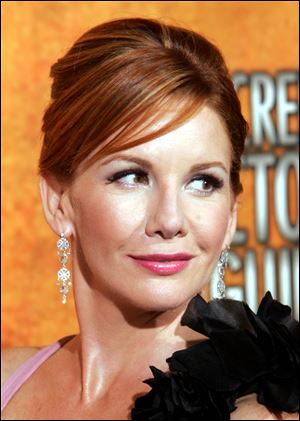
Gilbert stars in Hallmark Channel holiday movie
12/11/2011
Melissa Gilbert has written, directed, and produced, as well as acted.
Melissa Gilbert basically grew up on television. For 10 years she played "Half Pint," the nickname for her character, Laura Ingalls Wilder, on the long-running Little House on the Prairie series (1974-84). A writer, director, actor, and mother of two sons and two stepsons, the 47-year-old split from second husband Bruce Boxleitner over the summer after 15 years of marriage.
Her autobiography, Prairie Tale: A Memoir, which came out in 2009, is a candid look at growing up on the set of Little House and much more, including her struggles with alcohol.
Adopted the day after she was born by actors Paul Gilbert and Barbara Crane, the former Screen Actors Guild president will star in the original Hallmark Channel movie The Christmas Pageant, which airs at 8 p.m. Sunday.
Excerpts from an interview:
Q: Your character in The Christmas Pageant gets fired. Have you ever been fired?
A: That is a very, very interesting question. I have never been fired, but I've been broken up with. It's funny, people should start using that now -- "You're fired, you're not my girlfriend anymore." (Laughs) But, I am proud to say I have never been fired.
Q: You have done just about everything you can do in your industry -- writing, directing, producing, acting. Do you consider yourself a perfectionist?
A: I think that I have high expectations of myself. I push myself hard. I don't know if I'm a perfectionist, because I don't think perfection is attainable or achievable. I used to try really hard all the time to be perfect, and it kind of made me crazy and sick, to be honest.
There is one thing I can guarantee and that is whatever I do in my life I am going to make mistakes. I have to allow myself those mistakes. It's part of staying sober, too. So I wouldn't say I'm a perfectionist, but I am particular. I like things done a certain way, and I expect a lot from myself, especially when I'm performing. I know when I'm in the groove, and I know when I'm not.
Q: Is there any ritual or routine that helps you get in the groove?
A: There is preparation that goes into whatever job I'm doing. It depends on how far away from me personally a character is. A lot of what I do is a combination of imagination and imitation. I can picture people that I've known or seen in my head when I'm reading a script and thinking about a character. I can remember or imagine situations that I've been in that are similar to the one that I'm putting myself in.
It is not exactly a formal process that one would learn from an acting teacher. I did some coaching sessions when I was much, much, much younger, in my late teens, but I never studied, so I can't break it down that way.
Q: You spent your childhood acting on Little House. Did it ever feel like work back then?
A: Yeah, it did later. When I was a young teenager is when it got difficult. At least as I've observed it, the teenage years are the years when we are supposed to be somewhat undisciplined and stretching the boundaries and pushing the limits. I am going through it with child number four right now. He just turned 16. So I've seen it.
I know with girls it's even more intense. I only have boys, but I remember. I remember not wanting to wear those petticoats and pantaloons and stuff. I remember wanting to dress like everybody my age did. I remember wanting to change my hair, and I wasn't allowed to. Apparently a nose job was OK (laughing) -- that I got a green light for. But the other stuff, I had to stay disciplined, and I had to maintain my work ethic and go to work every day. I just wanted to play with my friends and drive my car. I could drive a lot of friends in my car since it was a station wagon.
Q: In your book Prairie Tale, you are open about your struggles with alcohol and your life, but through it all you seem to have maintained a good moral compass.
A: Thank you. It comes from my parents. It comes from a sense of faith, a belief in something greater than myself. I mean basically I was born without being a sociopath. I know the difference between right and wrong, and I exact a heavy price when I am wrong or bad or whatever. I beat myself up more than anybody. So I'm not sure where it came from. I think it just is, and I think everybody has it, or most people do.
Q: Did you feel you had a lot to live up to after such a successful career as Laura Ingalls?
A: I felt a certain burden of responsibility to be that girl off camera as well as on. I did feel eyes on me when I would go out or be out. I felt that I had to behave a certain way and obviously be polite and grateful when people would ask for an autograph. Sometimes that wasn't an easy thing to do, especially under extreme circumstances or if I was cranky or tired or if I was eating or back then if I was on a date. It's a weird situation to be in as an adolescent because everybody is looking at you, and you are a total freak anyway.
The Block News Alliance consists of The Blade and the Pittsburgh Post-Gazette. Patricia Sheridan is a writer for the Post-Gazette.
Contact her at: psheridan@post-gazette.com.